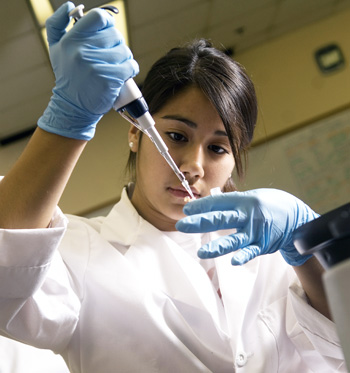In late September, Hunter R. Rawlings, III, the leader of the Association of American Universities, told state lawmakers that Texas ought to focus on producing more college graduates in the fields of science, technology, engineering and math (STEM). I couldn’t agree more.
 Programs that we have initiated in the College of Natural Sciences at The University of Texas at Austin over the last decade are helping us achieve that goal. More students are now pursuing undergraduate degrees in science and mathematics than ever before in the college. We are educating and graduating more of the world’s future doctors, innovators and entrepreneurs at a time when we desperately need to do so.
Programs that we have initiated in the College of Natural Sciences at The University of Texas at Austin over the last decade are helping us achieve that goal. More students are now pursuing undergraduate degrees in science and mathematics than ever before in the college. We are educating and graduating more of the world’s future doctors, innovators and entrepreneurs at a time when we desperately need to do so.
The college has doubled our total number of graduates over the last two decades, from 865 in 1992 to 1682 in 2011. In one of our core programs the graduation rate for Hispanic students has increased by 50 percent. And, this fall, 9,700 undergraduates are pursuing degrees in the College of Natural Sciences, up 17 percent from 2006.
We have been able to achieve this by creating a suite of innovative opportunities for undergraduate education and a robust, inquiry-based learning experience that allows students to succeed. I daresay that we are leading in science education more effectively than any university in the country with programs that focus on inquiry learning in small communities.
Given that UT Austin is the largest university in Texas and our college is one of the largest colleges of science in the country, our ability to boost our numbers of science and mathematics graduates — while improving, not sacrificing, quality in education — has a large downstream social and economic impact.
Our Freshman Research Initiative involves nearly a third of our 2,000 freshmen in hands-on research during their first year. It allows new students to do everything from biofuels research to programming autonomous cars and exploring brain tumor pathology. The Texas Interdisciplinary Plan, which creates small, rigorous academic communities for students, has been achieving similar successes for years.
[pullquote]The college has doubled our total number of graduates over the last two decades.[/pullquote]Our college is a core college open to all freshmen who have been admitted to UT Austin; one that teaches very challenging material in everything from astronomy and biology to physics and statistics. But we are now better preparing students to enter our college before their first day of classes. College readiness programs connect them with tutors, mentors and online learning opportunities during the preceding summer. By doing this, many of our incoming students can improve so much in one summer that they are able to skip to higher level coursework here, reducing their time to graduation. We have also gotten much better at helping students find the right major early.
Once they are here, we train hundreds of upperclassmen and women each year to take leadership roles in the college through our mentor leadership academy. These student leaders in turn work with incoming freshmen. So, we may be 9,700 students strong, but the majority of our students get the experiences of a small college.
We see the results in our higher graduation rates, increased enrollment and greater success for minority students.
There is always room for improvement, and we are working every day to raise our graduation rates, retention numbers, and opportunities for success for our students. But our compass is pointed in the right direction, allowing Texas’ future to be headed in the right direction.
Dr. David Laude is the interim dean of the College of Natural Sciences at The University of Texas at Austin, a professor of chemistry and biochemistry, and an award-winning educator.


















Comments 2
Hey, Dave. This was a great article. I am so proud of the College of Natural Sciences and UT, of course. Hugs, Shirley Reed
An intriguing discussion is definitely worth comment. There's no doubt that that you need to write more about this subject matter, it may not be a taboo matter but typically folks don't speak about such topics. To the next! Best wishes!!